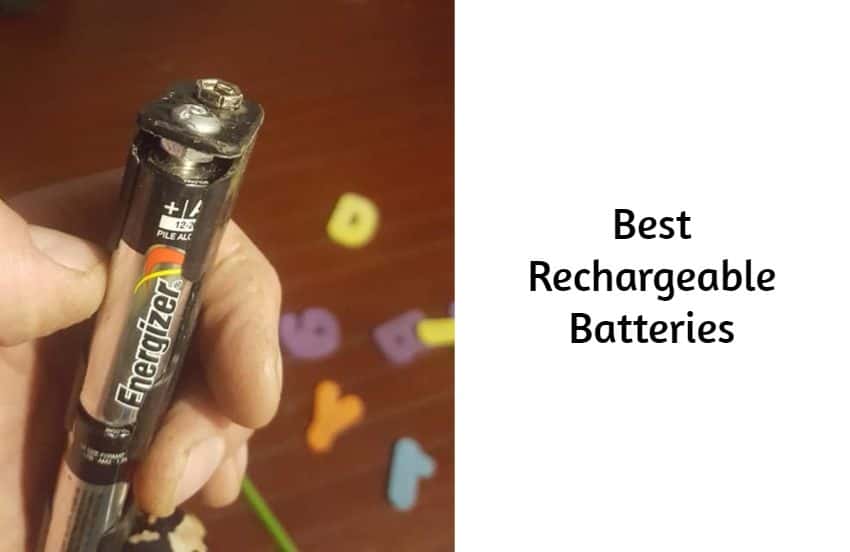
As you might already know, metal detectors need fully charged batteries to be able to operate on their max potential. The best case scenario here is to use rechargeable batteries …
… Otherwise you will find yourself with the necessity to buy couple new batteries after each couple of hunts!
In this Post, I breakdown the best rechargeable batteries you should use with your detector.
Best rechargeable batteries for metal detecting …
1. Panasonic Eneloop AA 2100
These batteries (Check Them Here at Amazon) are ready to use Ni-Mh rechargeable batteries that are capable of being charged up to 2100 times.
Below its main features:
- Able to maintain 70% charge for nearly ten years
- Up to 2000mAh in AA batteries and 800 mAh for AAA batteries
- Comes pre-charged with solar energy at the factory in Japan
- Can operate just fine at extremely low temperatures of -4oF
- Recyclable
2. Energizer Rechargeable AA Batteries
This is another popular rechargeable battery (Check it Here at Amazon) that you can utilize for your detection machine.
Below some of what it brings to the table:
- Its storage temperature is between -20oC and 30oC
- They come pre-charged
- A single charge should allow you to detect for around 8 hours.
- Each Energizer battery can be charged up to a 1000 times, with a single charge lasting up to 12 months in storage
- They have a capacity of 2300 mAh and can be used effectively in extreme conditions as well.
3. Duracell Rechargeable AA Batteries
I personally use these batteries (Check them Here at Amazon) for various usages and I was never disappointed.
Below some of its features:
- They can be recharged hundreds of times.
- Available in three different capacities: 900 mAh, 1300 mAh, and 2500 mAh
- Could stay charged for up to 12 months when not in use
- Once charged, the 2500 mAh battery can keep your detector running for several hours straight.
- They are equally effective in extreme temperatures.
What are the different types of batteries a Metal Detector could use?
There are several types of batteries that are commonly used in a metal detector:
- Alkaline Batteries: This is the most popular type of battery used in detectors. However, they have one major disadvantage, which is extreme internal resistance. Due to this, they run for much less time as compared to other types of batteries. Alkaline batteries are known to perform poorly in low temperatures, which adversely affects metal detecting in cold weather. This can even cause harm to your metal detector.
- Salt Batteries: These are used commonly. Even though they are one of the cheapest batteries available, they are not considered to be ideal for metal detecting. They are also known to cause damage to your detector. This is why it is better to avoid using salt batteries.
- Lithium Batteries: Even though these are more expensive, lithium-ion batteries are known to be more reliable. The only drawback of this type of battery is that they are quite costly, and this is why they are not so common.
- Nickel-Cadmium (NI-CD) Batteries: These are the most affordable and long-lasting batteries, making them ideal for metal detecting. These batteries also work well in extreme temperatures.
- Heavy-duty Batteries: These are an advanced design of the old zinc-carbon batteries. These are 50 percent better than the previous zinc-carbon batteries. However, these are single-use batteries and only deliver 1.5 volts. They also have a short shelf life and need to be stored at room temperature. Today, these batteries are no longer recommended by manufacturers of metal detectors.
- Rechargeable batteries: This new generation of batteries can maintain their charge for months, and charging them is also very cheap. Before buying rechargeable batteries, you have to consider their capacity, how long the charge lasts when the battery is in use and when in storage, and how much the capacity deteriorates after charging them a couple of times. You will also need to get a battery charger if you opt for using rechargeable batteries. Keep in mind that charging a battery may take a couple of hours. Also, quick charging will reduce the life of these rechargeable batteries.
What is the Best Battery type a Detector should use?
One of the best types of batteries for using in a metal detector is Nickel-Metal Hydride (Ni-MN) batteries. These batteries are considered to be ideal for metal detecting because of their capacity of nearly two to three times greater than Nickel-Cadmium batters. However, in difficult weather conditions, such as in low temperatures, the nickel-metal hydride batteries can also end up losing their capacity.
Also, unlike nickel-cadmium batteries, nickel-metal hydride batteries do not contain any heavy metals that may have toxic effects on your health.
The nickel-metal hydride batteries also store up to 50 percent more power than the nickel-cadmium batteries, and also do not suffer from any memory effects.
In recent years, nickel-metal hydride batteries have started coming in higher capacity that too in the popular AA size, which is the most commonly used battery size in most metal detectors. Now, these batteries are available in capacities ranging from 1500 to 2700mAh. This is highly beneficial, and you should consider taking these powerful capacity batteries along with you when you know that you will be detecting in difficult weather conditions.
Final Thoughts …
Hope this short article has given you many ideas on the Batteries you should be using with your machine!
Rechargeable batteries are really cost effective on the long run and that’s the main reason why I am recommending them here.
To learn more about the tool you need for your detection journey, then just have a look at this metal detection gear list. You will learn a lot.



